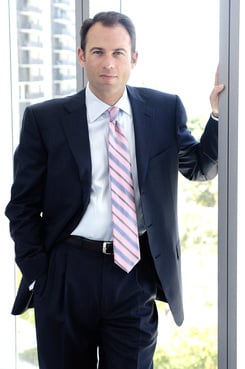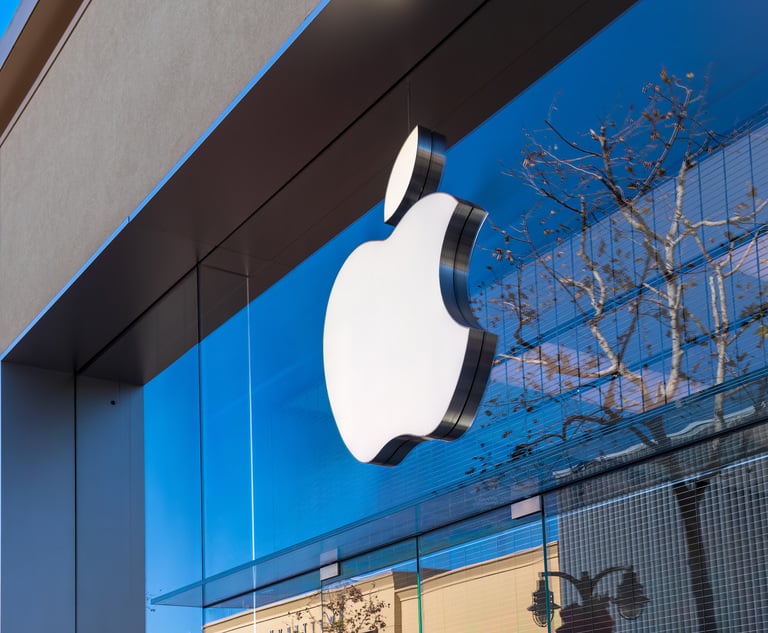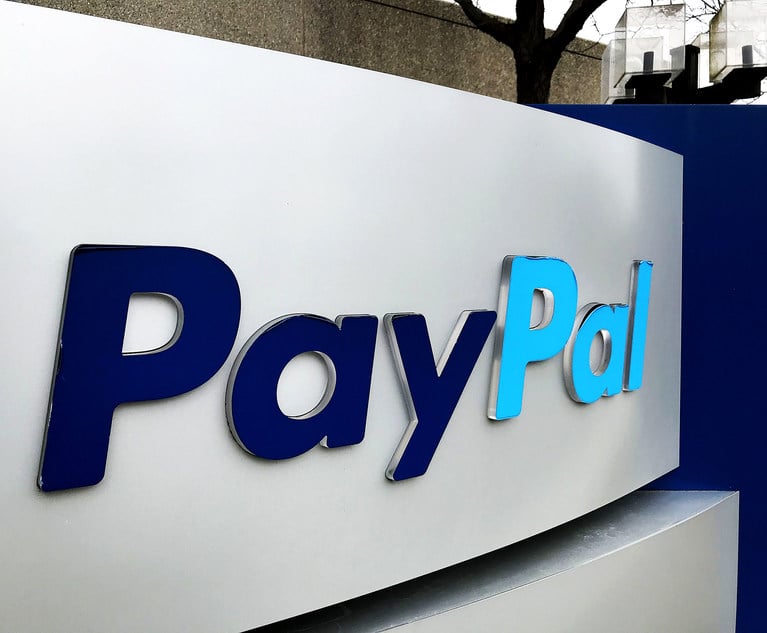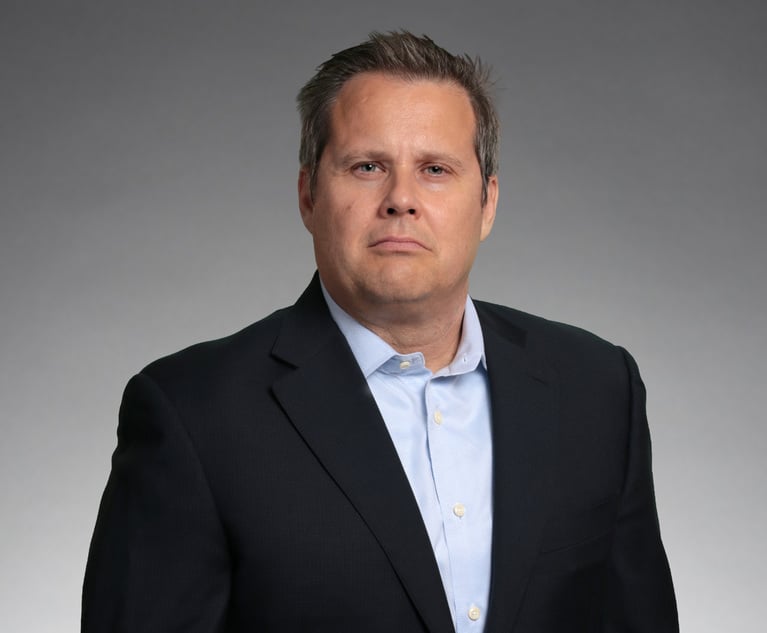Meet the SoCal Litigator Behind the Stormy-Trump Drama
Michael Avenatti claims that "there is a considerable amount of information that has not been disclosed" about his porn star client's former relationship with the president.
March 08, 2018 at 07:16 PM
5 minute read

Michael Avenatti, no stranger to high-profile skirmishes, is bracing for another battle after filing a suit this week against President Donald Trump in Los Angeles Superior Court.
The St. Louis transplant, who now runs his own litigation shop in Newport Beach, California, predicts that his latest courtroom contest will be no cakewalk.
“No. 1, you better be prepared for a street fight,” said Avenatti, who has sued Trump before. “No. 2, you better be prepared to be aggressive. And No. 3, you better be prepared for punches along the way.”
Avenatti is now representing Stephanie Clifford, an adult entertainment star better known as Stormy Daniels, who has alleged that she and Trump engaged in a consensual intimate affair that began in 2006 and continued into the following year. Trump has denied the allegations through White House spokeswoman Sarah Huckabee Sanders.
In her suit, Daniels claims she should be free to talk about her alleged affair with the president because Trump never signed a confidentiality agreement negotiated by Trump's personal lawyer and former Phillips Nizer partner Michael Cohen, which was finalized just prior to the 2016 U.S. presidential election. (Cohen's $130,000 payment to Daniels for her silence is the subject of a Federal Election Commission complaint.)
Also in 2006, another Avenatti client, Velocity Entertainment Group, settled for an undisclosed sum another suit filed against Trump and television producer Mark Burnett. Velocity had claimed Trump and Burnett lifted the idea for the hit show “The Apprentice,” which spawned myriad spin-offs.
Given the potential political consequences of Daniels' battle with Trump, plenty of lawyers and journalists have offered suggestions for Avenatti's legal strategy, including one by The New York Times columnist Charles Blow, who tweeted: “Can some benevolent billionaire who loves this country just pay the $1 million dollar penalty keeping Stormy Daniels from sharing her story, including the text messages and photos. Pleaseeeeee …”
Avenatti nixed that scenario, citing the specific terms of Daniels' contract.

“It doesn't work like that,” said Avenatti, who began his legal career at O'Melveny & Myers.
And why not?
Daniels' contract calls for her to pay a fine of $1 million per incident, although it doesn't clearly define what one incident might be, so she could be facing a fine of up to $100 million if she talks, Avenatti said. But if Daniels does win her legal right to share her story, part of which In Touch Weekly published in January as a result of a previously unpublished 2011 interview, Avenatti expects that the nation will be grateful.
“There is a considerable amount of information that has not been disclosed,” he said. “The American people are going to find her credible and they are going to be interested in it. Let them decide who is telling the truth.”
Asked how he came to represent Daniels, Avenatti said that there is only “a small subset of firms” that have the resources and skillset to cope with the deluge of media attention that such a matter as this requires.
Avenatti and Eagan Avenatti, a previous firm he formed in 2007, according to his current firm's website, have won big cases. In 2015, he beat the National Football League after a two-week jury trial in Dallas, obtaining an order getting Dallas Cowboys owner Jerry Jones to the witness stand in a dispute over Super Bowl tickets.
In April 2017, Avenatti prevailed against Kimberly-Clark Corp., spin-off Halyard Health Inc. and their lawyers from King & Spalding when he secured a $454 million fraud verdict in a Los Angeles federal court. The class action suit, which was featured on CBS's “60 Minutes,” involved surgical gowns that allegedly failed to protect medical personnel from infection.
One month before that big verdict, in March 2017, an alleged creditor named Gerald Tobin, later purported in court documents to be a private investigator, filed an involuntary bankruptcy petition against Eagan Avenatti over a claim for payment worth less than $30,000.
In January, Eagan Avenatti filed a motion with the Los Angeles Bankruptcy Court to approve a settlement and dismissal of that involuntary case. The motion is pending. In it, Eagan Avenatti argues that, as a class action and contingency fee plaintiffs firm, it does “not pay out fees and costs until litigation is concluded or settled, which often takes several years during which the [the firm] routinely invests millions of dollars in investigating claims, conducting discovery, hiring experts, and preparing for trial.”
Eagan Avenatti's revenue stream is “chunky,” the firm said in its motion to the Bankruptcy Court, but “it is very profitable over time.”
The firm's primary dispute was not with the petitioning creditor “but with three former attorney employees” of the firm, the motion stated. The former employees and Eagan Avenatti disagreed about sunken costs and claims to settlements, according to the motion.
On Feb. 23, Eagan Avenatti also filed an objection to an application for $36,000 in fees and expenses filed by Baker & Hostetler, its initial debtor counsel. The firm was replaced a year ago after the bankruptcy case was moved from Florida to Los Angeles. (Pachulski Stang Ziehl & Jones, which in late January filed an application with the court seeking almost $1.5 million in legal fees and expenses, is now representing Eagan Avenatti.)
Avenatti declined to discuss his former firm's involuntary bankruptcy proceedings. Of course, in facing off against Trump, Avenatti has an adversary well-versed in the machinations of Chapter 11. The Washington Post has reported that Trump's companies have filed for bankruptcy six separate times.
This content has been archived. It is available through our partners, LexisNexis® and Bloomberg Law.
To view this content, please continue to their sites.
Not a Lexis Subscriber?
Subscribe Now
Not a Bloomberg Law Subscriber?
Subscribe Now
NOT FOR REPRINT
© 2025 ALM Global, LLC, All Rights Reserved. Request academic re-use from www.copyright.com. All other uses, submit a request to [email protected]. For more information visit Asset & Logo Licensing.
You Might Like
View All
Music App Denied Injunction Against Apple Over Alleged Scheme to Block Its Access to App Store

'It's Not Going to Be Pretty': PayPal, Capital One Face Novel Class Actions Over 'Poaching' Commissions Owed Influencers

'Biggest Influencer Scam of All Time'?: PayPal Accused of Poaching Commissions Via Its 'Honey' Browser Extension

K&L Gates Secures $10.5M Verdict for Washington Meat Retailer in Lawsuit Over 'Boneless' Chicken Product
Trending Stories
- 1Who Are the Judges Assigned to Challenges to Trump’s Birthright Citizenship Order?
- 2Litigators of the Week: A Directed Verdict Win for Cisco in a West Texas Patent Case
- 3Litigator of the Week Runners-Up and Shout-Outs
- 4Womble Bond Becomes First Firm in UK to Roll Out AI Tool Firmwide
- 5Will a Market Dominated by Small- to Mid-Cap Deals Give Rise to a Dark Horse US Firm in China?
Who Got The Work
J. Brugh Lower of Gibbons has entered an appearance for industrial equipment supplier Devco Corporation in a pending trademark infringement lawsuit. The suit, accusing the defendant of selling knock-off Graco products, was filed Dec. 18 in New Jersey District Court by Rivkin Radler on behalf of Graco Inc. and Graco Minnesota. The case, assigned to U.S. District Judge Zahid N. Quraishi, is 3:24-cv-11294, Graco Inc. et al v. Devco Corporation.
Who Got The Work
Rebecca Maller-Stein and Kent A. Yalowitz of Arnold & Porter Kaye Scholer have entered their appearances for Hanaco Venture Capital and its executives, Lior Prosor and David Frankel, in a pending securities lawsuit. The action, filed on Dec. 24 in New York Southern District Court by Zell, Aron & Co. on behalf of Goldeneye Advisors, accuses the defendants of negligently and fraudulently managing the plaintiff's $1 million investment. The case, assigned to U.S. District Judge Vernon S. Broderick, is 1:24-cv-09918, Goldeneye Advisors, LLC v. Hanaco Venture Capital, Ltd. et al.
Who Got The Work
Attorneys from A&O Shearman has stepped in as defense counsel for Toronto-Dominion Bank and other defendants in a pending securities class action. The suit, filed Dec. 11 in New York Southern District Court by Bleichmar Fonti & Auld, accuses the defendants of concealing the bank's 'pervasive' deficiencies in regards to its compliance with the Bank Secrecy Act and the quality of its anti-money laundering controls. The case, assigned to U.S. District Judge Arun Subramanian, is 1:24-cv-09445, Gonzalez v. The Toronto-Dominion Bank et al.
Who Got The Work
Crown Castle International, a Pennsylvania company providing shared communications infrastructure, has turned to Luke D. Wolf of Gordon Rees Scully Mansukhani to fend off a pending breach-of-contract lawsuit. The court action, filed Nov. 25 in Michigan Eastern District Court by Hooper Hathaway PC on behalf of The Town Residences LLC, accuses Crown Castle of failing to transfer approximately $30,000 in utility payments from T-Mobile in breach of a roof-top lease and assignment agreement. The case, assigned to U.S. District Judge Susan K. Declercq, is 2:24-cv-13131, The Town Residences LLC v. T-Mobile US, Inc. et al.
Who Got The Work
Wilfred P. Coronato and Daniel M. Schwartz of McCarter & English have stepped in as defense counsel to Electrolux Home Products Inc. in a pending product liability lawsuit. The court action, filed Nov. 26 in New York Eastern District Court by Poulos Lopiccolo PC and Nagel Rice LLP on behalf of David Stern, alleges that the defendant's refrigerators’ drawers and shelving repeatedly break and fall apart within months after purchase. The case, assigned to U.S. District Judge Joan M. Azrack, is 2:24-cv-08204, Stern v. Electrolux Home Products, Inc.
Featured Firms
Law Offices of Gary Martin Hays & Associates, P.C.
(470) 294-1674
Law Offices of Mark E. Salomone
(857) 444-6468
Smith & Hassler
(713) 739-1250






